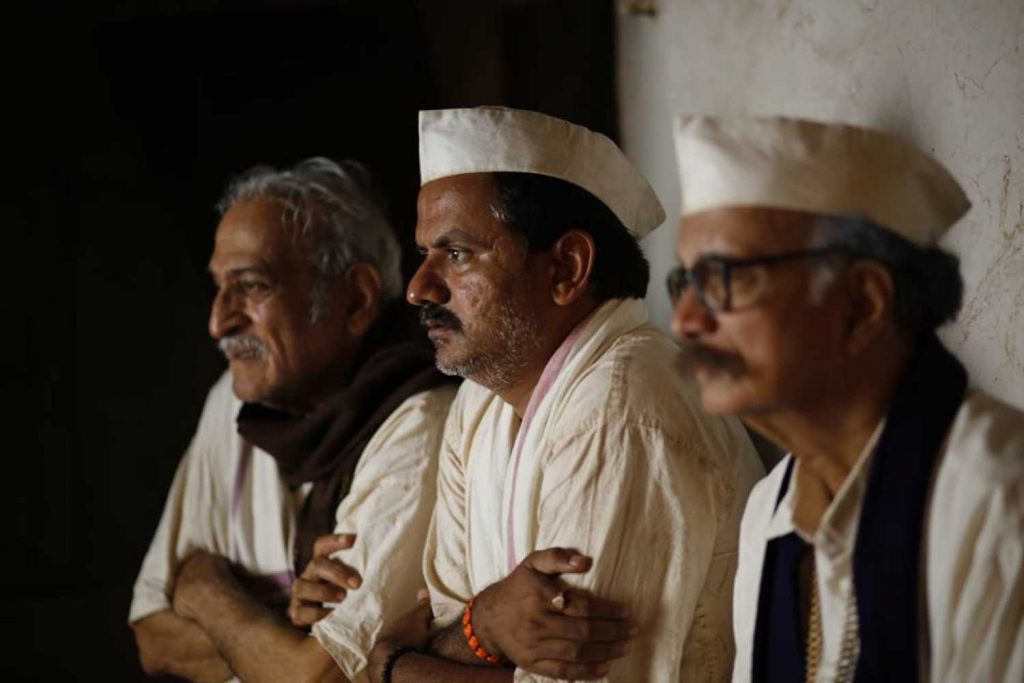The importance of seeing the world deeply is at the heart of the late Sumitra Bhave’s Marathi film, Dithee (2019), currently streaming on SonyLiv. The film, made sans Bhave’s regular directorial partner, Sunil Sukthankar, benefits greatly from its graceful execution and its ever-so-minute observations of the smallest of details of it characters’ lifestyles, thereby living up to its title. Based on noted Marathi writer DB Mokashi’s original story, Aata Amod Sunasi Ale, while Dithee‘s plotting is not particularly unconventional, the film fearlessly explores as well questions our faith when we are confronted with adversity. This forms the foundation of the film’s somber and observant narrative.
The film begins in a village in Maharastra with the tragic accident of Ramji’s (Kishore Kadam) only son (Omkar Govardhan), who gets drowned in the river current four days earlier. His pregnant daughter-in-law, Tulasa (Anjali Patil), is so shocked by the news of the sudden demise of her husband that she prematurely delivers a baby girl. This makes Ramji angry because he had asked her to give him back his son by giving birth to a boy. Now he can’t even bear the crying of the newly born girl and wants Tulasa to leave the house with the child. Ramji’s well-wishers and friends in the village, Joshibuva (Mohan Agashe), Santu (Dilip Prabhavalkar), and Govinda (Girish Kulkarni) are now worried that Ramji’s lineage is over. Santu suggests that a scripture recital will calm the dazed mind of their friend. But as Santu starts the reading of the scripture it only serves to accentuate Ramji’s pain. Meanwhile, a married couple in the village, Shiva (Shashank Shende) and Parubai (Amruta Subhash), are facing a difficult situation of their own as their cow, Saguna, is in pain as she is having complications in delivering her calf. Only Ramji can ease the discomfort of the domestic bovine and help her succeed in the process of giving birth. But the couple is hesitant to call upon the mourning father. As the situation gets out of control, the couple decides to seek his help nevertheless. The birth of the calf finally helps Ramji overcome his crisis of faith.
In Dithee, the narrative style of the film cuts two ways. On one hand, it is a film of domestic rhythms, concerns, and relationships. By pacing the script skilfully, Bhave gets us to feel the fullness of this kind of life. At the other end, it is also an intense and turbulent tale making use of several motifs that are ultimately harmonized by Ramji’s spirituality. The flashback scenes of Ramji participating in pilgrimage, moments spent with his now deceased son, his singing of devotional poetry or consoling a villager, who has lost a dear one, are shot in monochrome and effectively evoke the nostalgia of bygone days even as they highlight the duality of belief and disbelief. In one of the moments of the film, Parubai imagines that Lord Shankar (Sunil Godse) and Goddess Parvati (Devika Daftardar) appear at her doorstep and bless her with a gem. As she toys with the precious stone, she finds herself adorned in a beautiful sari along with ornate jewelry and is served with a luxurious food platter. But soon her illusions go away and she realizes that it was just a dream. She tells the Mother Goddess to forget about her pitiable condition and instead bless her son with a good and healthy bride. This particular scene highlights the thematic concerns of the film and arises organically from the belief system of the characters and the natural world surrounding them, where children play a crucial role in the universe of the film. The scene, where Ramji helps Saguna to deliver the calf, gives the viewer an impression of birth as a means of sublime communion.
The film has a strong ensemble cast of some of the most well-known actors of the Marathi film industry, who convincingly play their roles to perfection. But even amongst them, Kishore Kadam stands out and delivers one of his finest performances to date. Dhananjay Kulkarni’s camerawork suitably brings out the claustrophobic desolation of the protagonist while Mohit Takalkar’s editing keeps the film flowing smoothly even as it retains its emotional quotient. The detailed and perceptive sound design of the rain-drenched village is yet another major strength of the film. In fact, the rain plays an important role within the narrative, metaphorically representing the emotional tumult of the protagonist as well as finally cleansing his bottled-up distress.
Overall, Dithee works well enough as a study of grief and reconciliation. And it does stay with us even after it’s over, something very few Indian films achieve today. For all its merits though, it does tend towards getting simplistic at times, thereby making one miss the richness and complexities of storytelling seen in her earlier films when the Bhave-Sukthankar duo worked in tandem.
Marathi, Drama, Color


